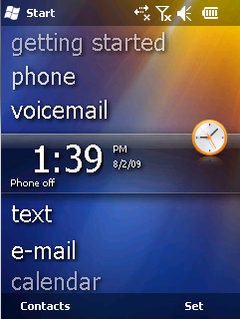Microsoft Windows Mobile
 |
|
|
Windows Mobile 6.5.3 screenshot
|
|
| Developer | Microsoft |
|---|---|
| Working state | Succeeded by Windows Phone |
| Initial release | April 19, 2000 |
| Latest release | 6.5.3 / February 2, 2010 |
| Latest preview | 6.5.5 |
| Marketing target | Mobile devices |
| Update method | Adaptation kit upgrade |
| Kernel type | Hybrid |
| Default user interface | Graphical |
| License | Proprietary software licensed to OEMs |
| Preceded by | Windows CE and Pocket PC |
| Succeeded by | Windows Phone |
| Official website | www |
Windows Mobile is a family of mobile operating systems developed by Microsoft for smartphones and Pocket PCs.
Its origins dated back to Windows CE in 1996, though Windows Mobile itself first appeared in 2000 as PocketPC 2000. It was renamed "Windows Mobile" in 2003, at which point it came in several versions (similar to the desktop versions of Windows) and was aimed at business and enterprise consumers. By 2007, it was the most popular smartphone software in the U.S., but this popularity faded in the following years. In February 2010, facing competition from rival OSs including iOS and Android, Microsoft announced Windows Phone to supersede Windows Mobile. As a result, Windows Mobile has been deprecated. Windows Phone is incompatible with Windows Mobile devices and software. The last version of Windows Mobile, released after the announcement of Windows Phone, was 6.5.5. After this, Microsoft ceased development on Windows Mobile, in order to concentrate on Windows Phone.
Most versions of Windows Mobile have a standard set of features, such as multitasking and the ability to navigate a file system similar to that of Windows 9x and Windows NT, including support for many of the same file types. Similarly to its desktop counterpart, it comes bundled with a set of applications that perform basic tasks. Internet Explorer Mobile is the default web browser, and Windows Media Player is the default media player used for playing digital media. The mobile version of Microsoft Office, is the default office suite.
...
Wikipedia

